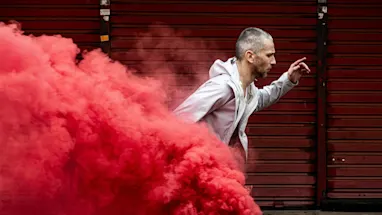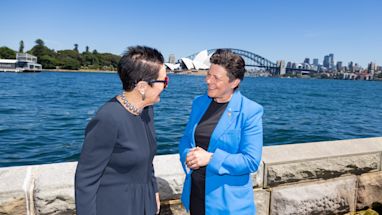
What's everyone drinking at the moment?
Cameron Higgins, neuroscientist and tech founder: “I’d like to say a whiskey sour…but I run a startup, so it’s whatever is on the happy hour special. Also, does BWS count as a bar?”
Dr Belinda Reeve, interested in the roles local governments can play in global food security: “I live in the inner west, and I like to support our local, independent craft breweries. So I'm going to go with a Wayward Hazy IPA.”
Dr Victoria Rawlings studies data around how gender and sexuality shape schoolyards and students’ futures: “During lockdown, my partner decided to make 50 different cocktails to try at home. Through this experience and some of the more questionable creations, I came to appreciate the absolute gold standard of either a gin and tonic or a craft beer.”
So now that we have their bar orders out of the way, we can move onto some bigger questions.
What does the future look like in your field of study?
Emma Bacon talks urban futures:
More and more people are coming to realise that the way we've built our cities isn't sustainable, equitable or fit for purpose. Everything we build should help us get to net zero carbon emissions with more creative solutions to housing, transport and urban planning. There's no point repeating the mistakes that have created the problems we're having to solve today.
Cameron Higgins talks big changes in neurotech: “That is the million dollar question. Neurotech is a nascent industry that has attracted a massive amount of investment in the last 5 years. Traditionally the field featured a bunch of quirky gadgets that were interesting but had no real world applications outside of a research lab. All of a sudden we’re at a tipping point, with the technology tilting into things that people can use in their day-to-day lives.”
Dr Victoria Rawlings sees hope in youth-led research: “I’m hopeful that reluctance to talk about gender and sexuality will be a thing of the past, as data shows how these conversations are already meaningful in school environments. The most powerful studies about gender, sexuality and education are those powered by young people’s voices. With greater participation of young people, teachers and whole schools as co-researchers, this field will generate power to positively shape policy, curriculum, and school cultures.”
How can your field or idea better humans, communities, cities or the planet?
Dr Ciaran O’Hare connects dark matter research to real-world benefits: “Dark matter represents a major gap in our understanding of the universe at the most fundamental level. Discovering what it is made of requires technology that vastly extends the limits of our senses as a species. So many of the devices we take for granted today are a result of people pursuing similar deep questions about nature. I’m not about to claim that in the future you’ll be taking dark matter pills to cure your ailments or putting dark matter petrol in your car. However, over time, the technology required to see dark matter will absolutely result in things that make the world better.”
Dr Belinda Reeve talks about local actions for global issues:
We're challenging people to 'think global, act local.' By exploring the role of councils in creating healthy and sustainable food systems, we're generating practical, local solutions to global challenges that can sometimes seem insurmountable.
Emma Bacon highlights the intersection of sustainability and wellbeing: “Heatwaves are our deadliest environmental disaster and kill more people than fire, flood and storms combined. Some of the best solutions for sustainable homes and suburbs will also improve our health and create more connected communities. The key will be to take these great ideas and to make sure they are shared equitably across our society.”
Siobahn Lyndon and Andrew Moore share an aerial view of the future of transportation: “The next wave of aviation will significantly reduce carbon emissions as well as improve patient outcomes with fast retrievals in light-air ambulances. We’re also looking to provide affordable, safe and rapid transport connections for regional communities.
Lastly, what other speaker would you most like to hear from at Raising the Bar and what would you ask them?
Wildlife lover, Dr Ciaran O’Hare: “I wish I could ditch my own talk and go see Emily Rowland’s talk 'The future of the oceans: what can the next gen do?' Just how frightened should I be about microplastics?”
Frequent flyer Dr Belinda Reeve:
I would love to hear from Siobhan Lyndon and Andrew Moore on 'The future of electric flights'. As a Kiwi living in Australia, I'm concerned about the environmental impact of my trips back to Aotearoa/New Zealand. I would like to ask them when the average traveller can realistically expect to see affordable, emissions-free air travel.
Cat lover, Dr Victoria Rawlings: “I would love to see Jennifer Kent’s talk on ‘Cars, canines & cities’ and ask her whether she thinks it’s also okay to bring cats on public transport. Mainly that’s just because I like to talk about cats for as much of the day as possible.”
Raising the Bar is on April 9 and tickets are still available.
Published 7 April 2024, updated 12 April 2024


